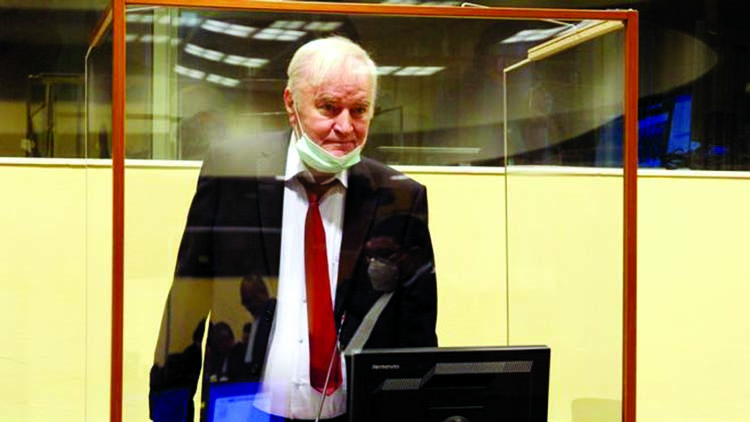
Ex-Bosnian Serb commander Ratko Mladic has begun appealing against his conviction for genocide and crimes against humanity, in a court hearing where three of the judges are taking part via video link.
The two-day hearing has already been delayed by Mladic’s health issues and the coronavirus pandemic.
Mladic was jailed for life in 2017.
He led forces during the massacre of Bosnian Muslims (Bosniaks) during the 1990s Bosnian war.
Mladic, 78, appeared in court on Tuesday, initially wearing a surgical mask before removing it. He will address the court in The Hague for 10 minutes on Wednesday.
As Tuesday’s session began, his lawyers told the UN court that the proceedings should not go ahead until a medical team had reviewed his capacity to take part. They argued he was wrongly convicted of “unscheduled incidents” made as accusations during his trial.
Originally convicted on 10 counts, prosecutors say he should also be found guilty of genocide against Bosniaks and Croats in 1992.
The trial appeared to be affected by technical issues. Presiding Judge Prisca Matimba Nyambe, who was among the judges following proceedings by video link, said at one point she was unable to decipher the defence lawyer’s words and would have to rely on transcripts. At one point defence lawyer Dragan Ivetic complained he could not communicate with his client “or be assured that he is able to meaningfully follow proceedings”.
Perspex screens separate the staff, most of the judges are taking part remotely via video link, security officers are wearing transparent visors and Ratko Mladic started the session in a pale blue disposable face-mask.
These hearings represent Mladic’s last chance to secure his freedom. If he loses his appeal, he will spend the rest of his life locked up.
Problems with the video conferencing connection – which at one point had the presiding judge mutter “this is nonsense” into the microphone – and translation audio will feed into the defence’s claim that conducting these critical hearings inhibited by Covid-19 restrictions risks jeopardising Mladic’s right to a fair trial.
Survivors have their hopes pinned on the prosecution’s appeal, which contends that the original verdict didn’t go far enough in recognising the true extent of his genocidal intent beyond Srebrenica, in other Bosnian municipalities, where his forces were accused of “ethnically cleansing” Bosnian Muslims in their quest to create a “greater Serbian republic”.
Mladic’s son, Darko Mladic, told the AFP news agency that his father “hasn’t been able to prepare” for the appeal hearing due to his health issues.
“He doesn’t have the energy needed for work of this kind and there are questions about how well his memory is working,” he said. A verdict is not expected until spring 2021.
The so-called “Butcher of Bosnia” had earlier needed an operation to remove a benign polyp on his colon, and had a request for a delay on health grounds rejected ahead of the hearing.
The Mothers of Srebrenica, a group of women related to victims of a massacre in the town in 1995, said the tribunal “must not lose motivation, and must carry out its mission”.
“We hope Mladic will be found guilty for genocide in other towns as well,” Munira Subasic, the organisation’s president, told AFP.
Mladic was the military commander of Bosnian Serb forces against Bosnian Croat and Bosniak armies. He went on trial at the International Criminal Tribunal for the former Yugoslavia (ICTY) in 2012, and was convicted in 2017.
The court found that he “significantly contributed” to the genocide in Srebrenica in 1995, where more than 7,000 Bosniak men and boys were murdered, the worst atrocity in Europe since World War Two.
The other charges included war crimes and crimes against humanity.
He was cleared of a second count of genocide in other municipalities. The court will hear an appeal by prosecutors against this acquittal this week.
At the end of the war in 1995 Mladic went into hiding and lived in obscurity in Serbia, protected by family and elements of the security forces.
He was finally tracked down and arrested at a cousin’s house in rural northern Serbia in 2011 after 16 years on the run.

